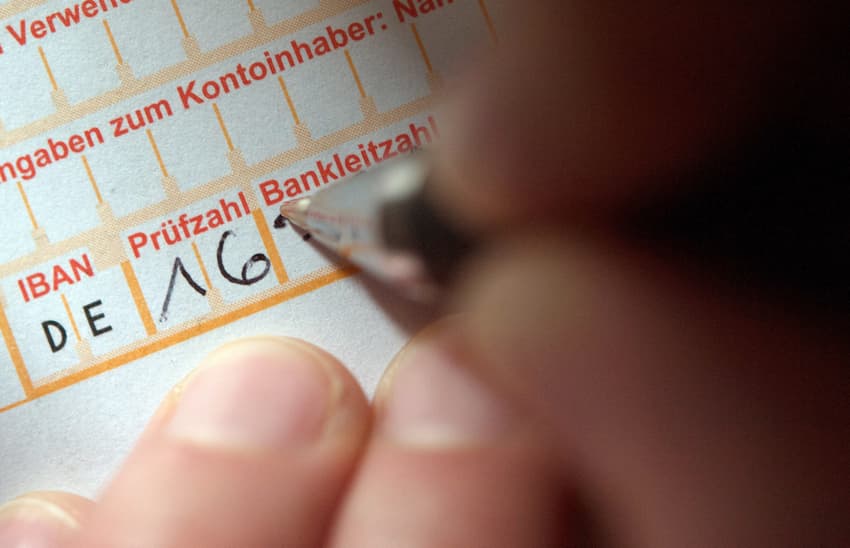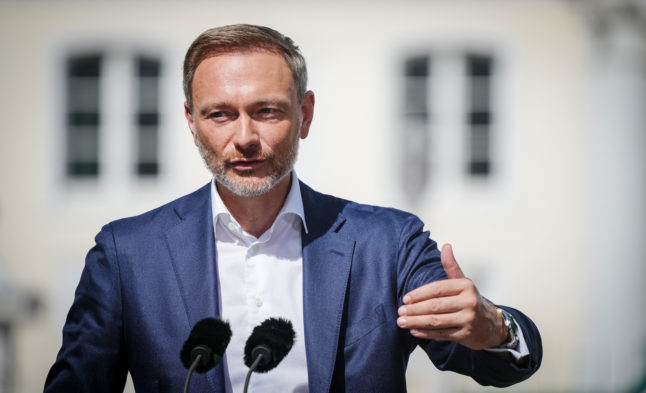Why Germany can't transfer payments to residents to help with energy bills

In the debate over autumn's relief measures, the spectre of Germany's poor digitalisation has once again raised its head - this time over how to make energy relief payments directly to people.
Germany's governing traffic-light coalition has been working intensively on a new set of measures to help the population with the ongoing energy crisis.
But now it appears that the government's plans to support citizens has hit a big hurdle: the creaking IT architecture in public offices and ministries.
At a press conference held on Wednesday following meetings at Schloss Meseberg in Brandenburg, Finance Minister Christian Lindner (FDP) was asked about proposals for a one-time payout to help lower- and middle-income households get through the winter.
"The recommendation that could unite most people and that most people support is a one-time payment to citizens - possibly up to a certain income bracket," Frankfurter Allgemeine reporter Ralph Bollmann asked.
"And the answer from the government is always just: we can't do it, we can't directly transfer money to citizens because we don't have their account numbers."
The same issue applies to plans to rebate part of the CO2 tax to households with a smaller carbon footprint, Bollmann said. This was mentioned in the coalition pact and reiterated in the previous relief packages, with the Finance Ministry charged with proposing a way to pay out the money by the end of the year.
READ ALSO: What to know about Germany’s new energy saving rules
"Why is that so difficult?", Bollmann asked. "And is there the prospect of anything changing or have you given up on this completely?"
Responding to the question, Lindner asserted that it was still part of the government's plans to pay out the money collected through the CO2 tax directly to citizens.
"That's not just a requirement of social justice but would also be a huge incentive to every individual to reduce their carbon footprint," he said. "But that's a hugely challenging plan."
Technical challenges
So far, the Finance Ministry has worked on the legal side of the issue, changing the relevant regulations and putting through amendments to the tax code to allow for citizens' tax IDs to be linked to their IBANs.
Once the relevant laws are in place, the technical implementation starts - which will involve relevant offices collecting the IBAN of citizens and linking them to their unique tax ID.
At this point, according to the Finance Minister, Germany's poor state of digitalisation will start to cause issues.
"There are quite a few of us Germans, which means quite a few IBANs that have to be collected," Lindner explained. "A few are already available, for example in social security or at the tax office. But it will take 18 months - according to the experts at the central tax office - to bring all of this data together."

Christian Lindner (FDP) answers questions at a press conference held at Schloss Meseburg in Brandenburg on August 31st. Photo: picture alliance/dpa | Kay Nietfeld
The problems faced by the government don't stop there, Lindner said.
"It goes further: according to the figures that are available to me, with their current IT capabilities, the public administration would only be able to make 100,000 payments per day," the FDP politician asserted. "Think about how many Germans we are! How long would it take to transfer payments to millions at a rate of just 100,000 per day?"
The revelations sparked a debate online, with many wondering why Germany isn't up to speed on this side of things.
Absolutely remarkable.
The German state is incapable of transferring money to its citizens because ... matching bank and tax IDs takes 18 months, and the admin can only handle 100k transfers a day anyway.
Merkel's devastating legacy, No. 2314. https://t.co/wQO3ihLYjH
— Christian Odendahl (@COdendahl) August 31, 2022
It's the latest in a serious of insights into the clunky government operations in Europe's largest economy.
In Digital Society and Economy Index (DESI) that was published in late 2021, Germany scored number 11th in a ranking of the level of digitalisation in EU member states, putting it roughly on par with Slovenia and Lithuania.
However, Lindner pledged that the latest setbacks wouldn't affect relief payments that are due to be made to citizens this winter - in particular, for pensioners who received less support in the last two relief packages.
READ MORE: What you need to know about Germany’s €300 energy relief payout
Pointing to the example of the €300 energy allowance, which is set paid out through businesses' payrolls and via tax rebates, the FDP politician said it was still possible for money to reach citizens via other means.
"The chancellor has said on various occasions that retirees also require support this winter," he said. "I can entirely understand this. And there will be technically viable options for that."
Comments
See Also
Germany's governing traffic-light coalition has been working intensively on a new set of measures to help the population with the ongoing energy crisis.
But now it appears that the government's plans to support citizens has hit a big hurdle: the creaking IT architecture in public offices and ministries.
At a press conference held on Wednesday following meetings at Schloss Meseberg in Brandenburg, Finance Minister Christian Lindner (FDP) was asked about proposals for a one-time payout to help lower- and middle-income households get through the winter.
"The recommendation that could unite most people and that most people support is a one-time payment to citizens - possibly up to a certain income bracket," Frankfurter Allgemeine reporter Ralph Bollmann asked.
"And the answer from the government is always just: we can't do it, we can't directly transfer money to citizens because we don't have their account numbers."
The same issue applies to plans to rebate part of the CO2 tax to households with a smaller carbon footprint, Bollmann said. This was mentioned in the coalition pact and reiterated in the previous relief packages, with the Finance Ministry charged with proposing a way to pay out the money by the end of the year.
READ ALSO: What to know about Germany’s new energy saving rules
"Why is that so difficult?", Bollmann asked. "And is there the prospect of anything changing or have you given up on this completely?"
Responding to the question, Lindner asserted that it was still part of the government's plans to pay out the money collected through the CO2 tax directly to citizens.
"That's not just a requirement of social justice but would also be a huge incentive to every individual to reduce their carbon footprint," he said. "But that's a hugely challenging plan."
Technical challenges
So far, the Finance Ministry has worked on the legal side of the issue, changing the relevant regulations and putting through amendments to the tax code to allow for citizens' tax IDs to be linked to their IBANs.
Once the relevant laws are in place, the technical implementation starts - which will involve relevant offices collecting the IBAN of citizens and linking them to their unique tax ID.
At this point, according to the Finance Minister, Germany's poor state of digitalisation will start to cause issues.
"There are quite a few of us Germans, which means quite a few IBANs that have to be collected," Lindner explained. "A few are already available, for example in social security or at the tax office. But it will take 18 months - according to the experts at the central tax office - to bring all of this data together."

The problems faced by the government don't stop there, Lindner said.
"It goes further: according to the figures that are available to me, with their current IT capabilities, the public administration would only be able to make 100,000 payments per day," the FDP politician asserted. "Think about how many Germans we are! How long would it take to transfer payments to millions at a rate of just 100,000 per day?"
The revelations sparked a debate online, with many wondering why Germany isn't up to speed on this side of things.
Absolutely remarkable.
— Christian Odendahl (@COdendahl) August 31, 2022
The German state is incapable of transferring money to its citizens because ... matching bank and tax IDs takes 18 months, and the admin can only handle 100k transfers a day anyway.
Merkel's devastating legacy, No. 2314. https://t.co/wQO3ihLYjH
It's the latest in a serious of insights into the clunky government operations in Europe's largest economy.
In Digital Society and Economy Index (DESI) that was published in late 2021, Germany scored number 11th in a ranking of the level of digitalisation in EU member states, putting it roughly on par with Slovenia and Lithuania.
However, Lindner pledged that the latest setbacks wouldn't affect relief payments that are due to be made to citizens this winter - in particular, for pensioners who received less support in the last two relief packages.
READ MORE: What you need to know about Germany’s €300 energy relief payout
Pointing to the example of the €300 energy allowance, which is set paid out through businesses' payrolls and via tax rebates, the FDP politician said it was still possible for money to reach citizens via other means.
"The chancellor has said on various occasions that retirees also require support this winter," he said. "I can entirely understand this. And there will be technically viable options for that."
Join the conversation in our comments section below. Share your own views and experience and if you have a question or suggestion for our journalists then email us at [email protected].
Please keep comments civil, constructive and on topic – and make sure to read our terms of use before getting involved.
Please log in here to leave a comment.